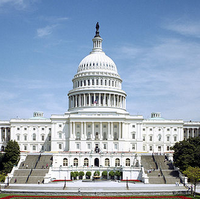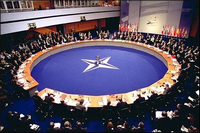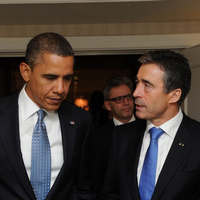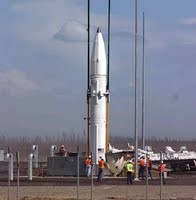I’ve only had a chance to scan some news surveys of the WikiLeaks diplomatic cables dump. And my first reaction was similar to watching a “making of” clip at the end of a movie: Everyone knows that diplomacy is a staged event that often requires the willing suspension of disbelief. That’s why we balance the official version offered by government spokespeople with off-the-record comments and tick-tock accounts describing what goes on behind the scenes. And the WikiLeaks diplomatic cables are a motherlode of behind-the-scenes accounts. To say that one version of the events is more important than the other, or […]
North America Archive
Free Newsletter

Art and culture are two pillars on which all societies build both identity and a sense of community. But despite the common function of culture in general, the task of developing coherent cultural-heritage laws and policies is complicated by the complexities of particular nations’ and cultures’ interactions with one another as well as the difficulty of finding concepts that are meaningful to all in order to define the resulting legal relationships. Western notions of property, ownership and restitution, for example, may not translate to other cultures, some of which function according to systems of beliefs and values that run counter […]

History tells us that, when a rising great power approaches the standing of the dominant system-shaping great power, conflict is inevitable, either directly or in such regions where their two spheres of influence intersect. The great counterexample is the acceptance by a “rising” America of the late-19th century of Great Britain’s implicit offer of a “special relationship,” which allowed the latter to punch above its weight throughout the 20th century. That alliance was subsequently forged in opposition to common enemies: first the Kaiser and then Nazi Germany, followed by the Soviet Union. China and the United States have no such […]
South Korea and the United States recently began a review of their bilateral nuclear energy agreement that expires in 2014. In an e-mail interview, Mark Hibbs, senior associate in the Carnegie Endowment for International Peace’s Nuclear Policy Program, discussed U.S.-South Korea civil-nuclear cooperation. WPR: What is the status quo in terms of U.S.-South Korean nuclear cooperation? Mark Hibbs: On the basis of a bilateral nuclear cooperation agreement from 1974, South Korea has built 14 of its 20 nuclear-power reactors with the help of U.S. industry and government agencies. The agreement permitted U.S. firms to supply technology, equipment and fuel for […]

The Convention on the Elimination of All Forms of Discrimination Against Women, or CEDAW, is getting its third shot at ratification after lying dormant in U.S. Senate subcommittees for the past 30 years. With the Obama administration’s support and a Democratic majority in the Senate, the timing for what’s known as the Women’s Treaty could be right. But even in the best of circumstances, CEDAW will still be up against tough odds. “It’s well known world-wide there’s a tremendous amount of obstructionism going on in the U.S., and today, regrettably, this convention is not at the top of the list […]

At the NATO heads-of-state summit held in Lisbon this weekend, the leaders of NATO member states resolved some important issues regarding the alliance’s future, but they deferred many key decisions for further deliberation. As a result, much of the summit’s outcome will not be definitively clear for some time. The topic that drew the most media attention this past weekend was how long NATO would continue its military effort in Afghanistan, and whether the alliance could actually win the war within whatever withdrawal timeline its members articulated. NATO leaders confirmed 2014 as the new target date for drawing down their […]

NATO approved a new Strategic Concept in Lisbon on Nov. 19, the first reworking of the alliance’s mission statement since 1999. Although the document offers plenty of promises, the alliance seems to have overlooked a number of problems it faces in making good on them. First, the promises. The new Strategic Concept: – calls on the allies to develop their capacity to “prevent, detect, defend against and recover from cyber-attacks,” to protect “critical energy infrastructure” and to “maintain robust, mobile and deployable conventional forces to carry out . . . Article 5 responsibilities and the alliance’s expeditionary operations.”– reaffirms the […]

The global financial crisis was a true system perturbation, revealing the gap between widely perceived risk and actual underlying risk in the world’s increasingly integrated financial system. As with any such vertical shock, the resulting horizontal waves continue to be felt long after the initial blow. When gaps in capabilities and rule-sets were subsequently discovered, the world’s major economies effected changes, like shifting economic oversight from the G-7 to the expanded G-20 and updating the Basel banking accord. In a world without true global government, these surges of great-power cooperation constitute a critical reassurance function, letting us know that an […]

President Barack Obama’s itinerary this month — first to Asia, then to Europe — will follow a path that recalls the setting of the sun. For some people, that image is a metaphor for American power, itself seen as waning. The theme of American decline is a familiar one, of course. It resurfaces more or less with every election, and with every poll that asks whether the country is “headed in the right direction.” However, the evocation of direction suggests a more apt image for Obama’s journey: the two-headed eagle. It was once a common feature of imperial heraldry — […]
As the current political narrative has it, President Barack Obama has been weakened by the midterm elections. So it should come as no surprise that his failure to sell Congress’ version of the U.S.-South Korea free trade agreement is a reflection of Obama’s weakened position, rather than, say, a reflection of Congress’ unrealistic expectations of what trade concessions other countries are willing to make in the current dismal economic environment. The same latent theme runs through much of the coverage of Obama’s tepid performance at the G-20 summit, although it is not as pronounced. So be it, narratives are often […]

In the run-up to NATO’s heads of state summit later this month in Lisbon, much of the discussion has focused on questions of the alliance’s relevance and identity, with particular attention paid to the alliance’s new Strategic Concept to be rolled out in Lisbon. But a more practical issue that will be discussed at the summit is whether to make comprehensive ballistic missile defense (BMD) an alliance-wide mission. Despite a lack of enthusiasm in Turkey and continuing discontent in Russia and perhaps some other non-NATO countries, NATO governments generally support the Obama administration’s phased adaptive approach to European missile defense. […]

For all their inflamed partisan passions and heated rhetoric, the 2010 midterm elections were conducted in a virtual foreign policy vacuum. In stark contrast to every election since 2002, national security played almost no role in either the Republican or Democratic national campaigns, with both parties preferring to argue about domestic issues such as the economy, unemployment, and government spending. The Republicans won soundly, taking control of the House of Representatives, and narrowing the Democratic majority in the Senate. But the domestic focus of this election means the new Republican representatives and senators will come to power with a fundamentally […]

For much of the last half-century, the U.S. has failed to engage the nations of resource-wealthy Latin America in any strategic manner. This lack of attention to our closest neighbors, and some of our strongest allies, is dangerously short-sighted given U.S. dependence on Latin America as a source for our energy. Currently, more than one-fourth of America’s imported oil comes from Latin America, which is estimated to hold 13.5 percent of the world’s proven oil reserves. In 2009, the U.S. imported 11 percent of its crude oil from Mexico, 9 percent from Venezuela, 3 percent from Brazil and 2 percent […]
In the aftermath of Tuesday’s midterm elections, President Barack Obama again sounded the theme of bipartisan cooperation, speaking of the need to find “common ground” and calling on both Democrats and Republicans to unite around solving the country’s pressing challenges. In theory, bipartisanship is a golden rule when it comes to foreign policy, where politics is supposed to stop at the water’s edge. That notion was first articulated by a Republican, Sen. Arthur Vandenberg, who at the outset of the Cold War, under the administration of Democratic President Harry Truman, argued that America’s position in the world would be weakened […]

On the same day that voters in the United States went to the polls to throw a punch into the gut of the political establishment, some 5,000 miles away, police in Greece had their hands full with a series of bombs mailed to foreign embassies. Greek investigators say the bombs, 11 of them in all, were probably the work of militant activists who, in their own violent way and to a much greater degree, also aimed to overturn the political and economic order. In recent months, angry efforts to take on the system have gained steam throughout the developed world […]
